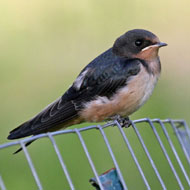
Study reveals species most likely to host flaviviruses
Some of Europe's most common bird species have been identified as hosts for a fatal virus that is endemic in parts of Asia.
The study, published in the journal Nature Communications, found that carrion crows and barn swallows could harbour Japanese encephalitis - an infection of the brain found throughout South East Asia, the Far East and the Pacific Islands.
Japanese encephalitis is found in birds and pigs and is transmitted to mosquitoes when they bite an infected animal.
It is thought that a rising population, together with increasing temperatures, could increase the number of mosquitoes that carry the virus in Europe, which may then lead to the virus becoming endemic in birds.
Speaking to The Guardian, Christine Kreuder Johnson, a co-author of the study and professor of veterinary medicine at University of California, Davis, said: “If the mosquito and the virus show up in Europe there are a number of wildlife hosts and the disease could cause quite a lot of problems.”
In the study, researchers identified the animal species most likely to host flaviviruses - a group of viruses that includes yellow fever, Zika, dengue and Japanese encephalitis.
After entering all known data into a computer modelling programme, they were able to identify the species most likely to harbour viruses. They found 173 species that harbour dengue virus, of which 139 had not been recognised until now.
Their study also revealed that primates are the main hosts of yellow fever and Zika. But of the 21 primate species thought to harbour the viruses, just nine have been identified with either of these diseases.
Image (C) WIkimedia Commons.



 The Animal and Plant Health Agency (APHA) has updated its online reporting service for dead wild birds.
The Animal and Plant Health Agency (APHA) has updated its online reporting service for dead wild birds.